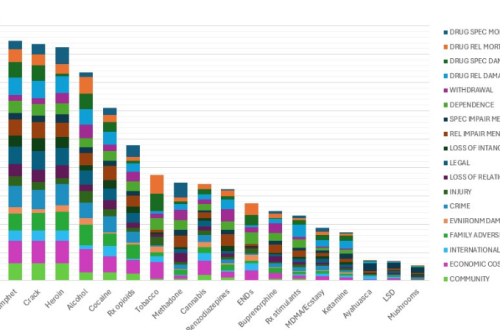Drug Policy Question of the Week – 5-17-12
As answered by Mary Jane Borden, Editor of Drug War Facts for the Drug Truth Network on 5-17-12. http://www.drugtruth.net/cms/node/3871
Question of the Week: Which drugs impair driving?
According to the National Highway Traffic Safety Administration and other sources, many do. Let’s take a look:
Alcohol “reduces the ability to see distant objects … Blurred and double vision can also occur. Alcohol may also create a sense of overconfidence, with the result that people are prepared to take greater risks.”
Amphetamines “have been associated … with driving impairment both in the stimulation and withdrawal stages; in the latter case especially as the drug interacts with fatigue.”
Antidepressants “can cause impairment, especially in circumstances where extremely high blood concentrations are measured … There is also an additional risk of impairment associated with combined use with alcohol.”
Antihistamines, “such as diphenhydramine, cause sedation, [which is] distinguished as … drowsiness.”
Barbiturates “are associated with delayed reaction times and possibly loss of concentration.”
Benzodiazepines (such as Valium® or Xanax®) “… desired/therapeutic effect … is sedation, which would obviously have a detrimental effect on driving.”
Methadone, “a narcotic analgesic, … may have differential performance effects in naive or recreational users versus tolerant therapeutic users …”
Opiates are “narcotic analgesics … [that] after an initial rush, … act as CNS depressants and certainly could have performance-decreasing effects.”
Sleep aids, such as Ambien®, “cause drowsiness and may cause dizziness. If consumed with alcohol, there is an increased likelihood of these symptoms. Sleep aids alone or in combination with alcohol could have a detrimental effect on driving ability.”
Cannabinoids “experimental and epidemiologic evidence [of their] … effects on driving are mixed. When marijuana is found in drivers, … it is often in conjunction with alcohol, where an impairing effect is more likely.”
Quite a long list for a simple question.
[Editor’s Note: Unless linked to other sources, the “Impairment by Drug” descriptions above come from the National Highway Traffic Safety Administration. This list can be found under “Impairment” in the Drug Testing Chapter of Drug War Facts.]



